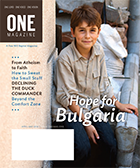
April-May 2014
Hope for Bulgaria
------------------
|

The High Cost of Cutting Curriculum
by David Womack
If you could put a dollar value on Christian education and discipleship, what would it be? You may immediately think one can’t put a value on that which is priceless. However, in reality, we put a dollar value on Christian education every time we order, by what we order, and if we don’t order at all. We would all agree that ongoing Christian education and discipleship of family and church is worth any amount. That’s a given. But as I examine the data at my disposal, the investment is shrinking for many churches.
As director of customer service and sales at Randall House, part of my responsibility is to analyze data on sales and trends in Christian resources, especially curriculum. Most mainstream, evangelical publishing houses (dwindling in number) regularly report declines in overall sales. Most denominational publishing houses that still produce curriculum (even fewer) report a decline as well. Several underlying issues are involved in this, none of which reflect a positive trend in Christian education and discipleship.
Two areas where costly cut-backs are often made are student resources and children resources. Two other areas of concern and consequence are the use of non-curricular and non-traditional resources, and non-denominational and non-Free Will Baptist resources.
Student Resources
Most churches generously invest in resources for the teacher, but this is only one side of the equation. Student resources (D6 devotional magazines) are not just add-on extras, they are central to the curriculum. D6 curriculum is intentionally designed to coordinate the efforts of the church and the home with resources for the teacher and the student. Each student should have his or her own age-appropriate devotional magazine to reinforce the Scripture and theme introduced by the teacher and to guide into deeper application of biblical truth. If the student’s resources are not provided, the effectiveness of the class is severely diminished.
Student resources are really home resources—tools to promote Christian education and discipleship at home. D6 curriculum incorporates several important tools to equip parents to engage in spiritual conversations at home. The student resources, or devotional magazines, are the key component.
The business term ROI (Return On Investment) applies here. Sometimes, the devotional magazines are considered non-essential items and therefore an area for potential budgetary cuts. When we evaluate the potential return on investment with devotional magazines, the savings are not worth the cost of what is lost. Another way to put it: “Is it worth investing in the homes and families of my church?”
Children’s Resources
I have heard it stated that Free Will Baptists are an aging denomination. While that observation may be true, it doesn’t mean we are a dying denomination. Many of our churches are small, struggling, and have more older adults than children. If that is reflective of your geographical demographic, it isn’t a negative thing, it’s just the facts of where you are.

I am a firm believer that churches should minister to everyone in their congregations, but I also believe we need to identify target areas for special investment. If my church had 30 older adults and only five children, I would not neglect the 30, but I would certainly identify the five as the target and intentionally focus on how to invest in their discipleship. If there are only three or four children in your church family, aren’t they worth the investment? Even if they only come to class twice a month, shouldn’t you do all you can to invest in their Christian education and discipleship? The cost of curriculum is really a non-issue when you look at the bigger picture of service for the kingdom. Saving a few dollars per quarter isn’t worth the cost of being ill-prepared to minister when opportunity comes.
Another point to consider is that “older generation” is usually synonymous with grandparents. Grandchildren are a mission field, even if they aren’t yours or don’t attend your church.
Non-Traditional and Non-Curricular Resources
The primary benefits of a curriculum are a systematic approach to exploring the story of the Bible and the depth and breadth in content. The best way to leverage these benefits is to invest in a curriculum that has a comprehensive scope and sequence and age-appropriate content. Scope and sequence simply refers to the map showing what a curriculum covers and the schedule it follows.
D6 curriculum follows a six-year scope and sequence, and each cycle provides new content, in a curriculum that encourages and equips for Christian education and discipleship through every age and season of life. Short-term Bible studies can be rich in content but always leave us to figure out what’s next. These are great supplements to our Christian growth and have their place in our arsenal of resources, but not as the core.
Christian education and discipleship is an ongoing process that requires ongoing investment and systematic support (emphasis on systematic). Teachers and classes that just “do their own thing,” or jump from one short-term study to another, do not have a framework of systematic support. There is value in discussing the Bible a chapter a week or using other Bible studies, but they do not provide the benefits of an ongoing curriculum, and, in themselves, can lead to weak biblical literacy. The Bible admonishes us to study the whole counsel of God, not piece-meal lessons from week to week. The backbone of your church’s Christian education and discipleship is not the place to cut back or improvise.
Non-Denominational and Non-Free Will Baptist Resources
Another area of concern, similar to the issue above, is the use of curriculum published outside of Free Will Baptists. As already stated, Christian education and discipleship should be guided by a comprehensive, systematic curriculum that supports every age group. Such a curriculum influences biblical literacy and develops worldview.
These are matters of doctrine. Should we trust these foundational teachings to a publisher that does not share our interpretation of Scripture? While I would never encourage Free Will Baptists to be submerged exclusively in our own movement, the core of our Christian education and discipleship should be rooted firmly in our own Articles of Faith. Sure, we can learn from the larger body of evangelical Christendom, and we should read and study broadly (look at any pastor’s library), but the core of our Christian education and discipleship should be rooted in Free Will Baptist doctrine.

You may find “less-expensive” curriculum options, but when we cut back on our own curriculum and invest in other curriculum, it carries consequences for multiple generations. Using D6 curriculum is an investment in perpetuating the faith of Free Will Baptists. For quality and content, D6 curriculum is a great investment.
The ongoing Christian education and discipleship efforts of the local church are absolutely worth the investment. Curriculum should be one of the areas we guard from budget cuts. Having served many years as a pastor, I am well aware that one of the first places scrutinized for budget cuts is the curriculum line item.
I will be the first to encourage churches and leaders to monitor what you use and adjust your orders accordingly. That’s just good stewardship. I do caution you to be careful when you “trim the fat” not to cut so deeply you lose the “meat.” It is always wise to be prepared for guests and growth. Consider other line item cuts with less significance, like the plates, cups, and coffee fund.
About the Writer: David Womack was ordained as a Free Will Baptist minister in 1987 and has served churches in Florida, Alabama, Georgia, and Illinois. He joined the Randall House team in August 2010, where he serves as director of customer service and sales. David and his wife Teresa live in Hendersonville, Tennessee.
|
|

